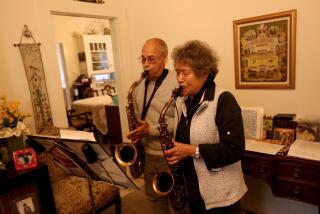At 55, Doctor Exults in His Newly Minted M. D.
NEW YORK â Dr. Robert Lopatinâs prescription for a fulfilling, no-regrets life: Donât be afraid of change, and never pass up an opportunity to try something new.
Heâs taken a healthy dose of his own medicine. At 55, Lopatin is fresh out of medical school, one of the oldest first-year residents in the country.
He works 100-hour weeks, including exhausting overnight calls, alongside colleagues young enough to be his children, while physicians his own age may ponder retirement.
Why bother?
Lopatin dreamed as a boy of becoming a doctor, but put his interest in medicine aside in college and eventually went into business with his father. They ran a womenâs clothing company for 27 years. A year or so after they sold it in the early 1990s, Lopatin decided it wasnât too late to fulfill his longtime dream.
âItâs like nirvana,â he said. âI feel like I died and was born again.â
When, at age 51, he began studying at the Albert Einstein College of Medicine, he was older than most of his professors--even older than the school itself. But he felt completely at home.
âIt was just thrilling, this feeling of picking up the pieces of something one had left aside,â he recalled. âI felt somewhat out of place as an older person, but as a student I felt absolutely in my element.â
Now half a year out of med school, Lopatin has just started a four-year residency at Montefiore Medical Center in the Bronx. A bachelor, he has moved out of his Manhattan apartment to live closer to the hospital and says itâs hard to find time for friends and family.
But he wouldnât have it any other way.
âWhen youâre older, once you do make a commitment to something . . . thereâs more purposefulness,â he said. âThings stay more in perspective.â
Lopatin admits the hours are tough; 6:30 a.m. to midnight workdays are common; graveyard shifts are required four times a month.
But he believes his maturity helps him practice better medicine, and colleagues and patients agree.
âHeâs a fabulous intern because he has a true devotion to what heâs doing,â says his supervisor, Dr. Lawrence Brandt. âBeing older, he sees things from a different perspective. . . . Patients immediately latch onto his positive qualities and see someone who they can trust.â
Ramona Cosme, 86, was treated recently by Lopatin and said she felt more comfortable with him than she would with a 20- or 30-something doctor.
âHe really worries about the patients,â she said in Spanish. âA person of a certain age has already gone through experiences of life . . . and had a chance to reflect upon them.â
Lopatinâs late leap to medicine was completely in character for a man whose life has been a continuous quest for education.
After long days working as a garment industry executive, he studied art history at Columbia University at night, completing all the requirements for a Ph.D. except his dissertation. He studied clothing production at the Fashion Institute of Technology and took classes in Spanish, French, Italian, German and Yiddish.
âIâve never been out of school,â he explained. âIt just makes me feel alive; thatâs who I am.â
When he left the garment industry in 1991, he headed straight for the classroom, though medicine wasnât yet on his mind. He studied Shakespeare and Latin, took calculus, enrolled in a U.N. training program for Spanish language interpreters.
Still intrigued by art history, he joined an archeological dig in Belgium in 1992. At a friendâs wedding in Zurich, he happened to sit near a young man whoâd just finished medical school. Talking with him reminded Lopatin of his own boyhood dream.
âHow many times is a person . . . genuinely free to be able to restart their life?â he asked. âI said to myself, âI have to at least pursue it . . . because if I donât I will be forever filled with self-reproach. I will have failed myself.â â
Lopatin entered a New York University premed program and was soon taking classes in biology, chemistry and physics.
He knew right away heâd made a good choice.
âIt took a lot of . . . imagination to do it, to get myself to do it, but once I undertook it, it just felt so right,â he said. âI felt I was home again.â
So what comes next?
Even now, Lopatin doesnât expect his career path to be straight. He says he might like to study for a masterâs degree in public health and get involved in international health care policy.
One thingâs for sure: âIâll die a doctor, whenever that comes.â

